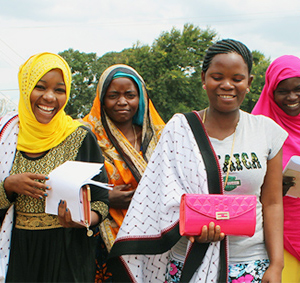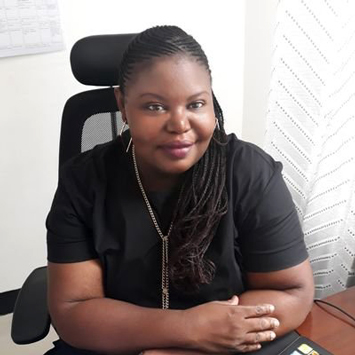Training young journalists and informing people in Tanzania
By Jehron Muhammad | Last updated: Oct 30, 2019 - 9:04:22 AMWhat's your opinion on this article?

|
Media, which is the Fourth Estate, can also highlight inaccuracies, expose corruption, and offer an outlet for new and fresh ideas that, because of limited resources, may have difficulty coming to light.

MediaSpace Tanzania introduces young people to the world of Journalism. Photo: mediaspace.or.tz
|
And, a fair and free press has the ability to encourage elected officials to be accountable to their constituents.
Spreading these values and creating a space for women is the current work of MediaSpace Tanzania and Interruptrr Africa, a digital newsletter.
During interviews with Africa Watch conducted from her office in Tanzania, East Africa, via phone and email, Vicensia Fuko, by training an attorney, discussed her strategy and more than 10 years of experience promoting media development, freedom of expression and how to “access to information in Tanzania’.”
As executive director for MediaSpace Tanzania, she engages with and supports local media. She also interacts with the public and institutions via “media development programs, media innovations, media advocacy and media literacy, utilizing storytelling and innovative approaches of doing journalism.”
Much of this is done in Tanzania’s first state of the art media lab. According to Fuko, “Media lab provides space to nurture young journalists on data journalism, investigative journalism, rural reporting and new media.”
Fuko is also an Interruptrr Africa team member representing Tanzania. So far Interruptrr Africa represents women in Uganda, Ethiopia, Tanzania, Malawi, Rwanda and Kenya. She envisions the number of countries represented increasing and as a responsible and informative media outlet, it is integral to give voice to issues that aren’t always given a platform.

Vicensia Fuko Photo: Twitter.com
|
Fuko, who is a member of the Mandela Young African Leadership Institute, created by President Barrack Obama, said, “As an attorney, I was so much pushing for human rights, especially the right to have access to information and the right to freedom of expression.”
But, she said, “The majority of the people I was working with had no clue about rights, and freedoms, and I thought the media would be the best starting point.”
Fuko holds a Master of Laws Degree in Intellectual Property Rights from Stockholm University and a Bachelor of Laws from the University of Dar Es Salaam. She is also trained in media studies and media programs such as reporting open contracting, internet governance, data journalism, investigative journalism, media capture and digital media.
Fuko started out working with established journalists, but over time gravitated toward young up and coming journalists, who were free and open to exploring new and more innovative ways of practicing their craft.
“I realized that I wanted to do more with young journalists, to equip more, to nurture more and guide more. My passion for journalism grew as I was engaging the young journalists in my work.” Young journalists, according to Fuko, “know how to connect with stories and with people. Consequently, I decided to focus on nurturing young journalists and equipping them with (the necessary) skills to produce compelling stories that would trigger accountability.”
MediaSpace’s “goal is to empower journalists to produce quality and interesting, and original content that engages and inspires the public to keep up with the news and embrace democratic values, human rights and good governance,” Fuko continued.
MediaSpace is conducting various projects, including a mini-lab series on Safety and Security for Women Journalists, a Sustainable Development Goals Book Club, and teaching techniques that equip young journalist with the skills and incentives to uncover and follow less covered, but just as important news items “and local content,” that doesn’t always get covered. This includes reporting happenings in rural, underserved communities.
With many “citizen journalists” working online, MediaSpace has instituted a “media literacy program to equip citizen journalists with basic journalist skills, as well as knowledge about media ethics and etiquette.”
“Technology is at the heart of our program,” said Fuko. “MediaSpace promotes the 4th Industrial Revolution, and we utilize storytelling as well as media to create awareness about public policy makers so that no one is left behind.”
MediaSpace is “setting up an online platform or one stop center for technology related content. (We) are working with data scientists to co-create stories on data and technology driven stories,” she added.
A major concern for MediaSpace is operating in a “male dominated” media, both at the management and working journalist level. MediaSpace says this impacts the diversity of voices and priority of issues that get covered. “There is a need to support women in media to take up more strategic roles in the newsroom and become the champions in fighting against sexual harassment, favorable working conditions, bullying, equal access to opportunities and their freedoms and security,” said Fuko.
“Also, MediaSpace believes that as much as the media is the gatekeeper and watchdog, it must be responsible to the community it serves. Media owes the public content which is good, inclusive, diverse and verified. Moreover, it’s clear that if media is misused, it may incite chaos, and may disrupt the democratic values that shape communities and promote peaceful co-existence with various groups within the community. Thus, MediaSpace, strives to engage journalists and community members (citizen journalism) into creating a safe and free media space that promotes human rights, transparency and democratic governance in Tanzania.”
Follow @jehronmuhammad on Twitter.
INSIDE STORIES AND REVIEWS
-
-
About Harriett ... and the Negro Hollywood Road Show
By Rabiah Muhammad, Guest Columnist » Full Story -
Skepticism greets Jay-Z, NFL talk of inspiring change
By Bryan 18X Crawford and Richard B. Muhammad The Final Call Newspaper @TheFinalCall » Full Story -
The painful problem of Black girls and suicide
By Charlene Muhammad -National Correspondent- » Full Story -
Exploitation of Innocence - Report: Perceptions, policies hurting Black girls
By Charlene Muhammad -National Correspondent- » Full Story -
Big Ballin: Big ideas fuel a father’s Big Baller Brand and brash business sense
By Bryan Crawford -Contributing Writer- » Full Story






 Click Here Stay Connected!
Click Here Stay Connected!








